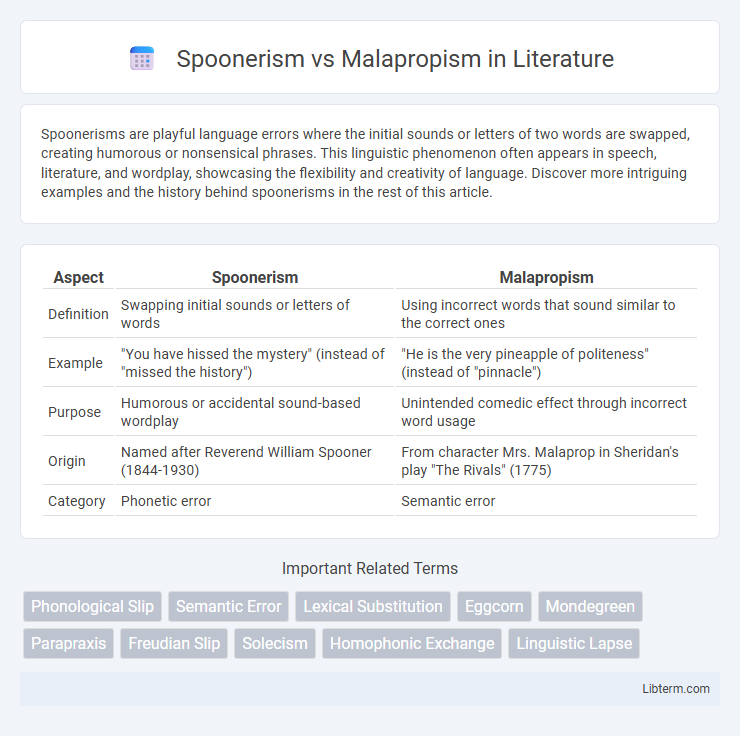Spoonerisms are playful language errors where the initial sounds or letters of two words are swapped, creating humorous or nonsensical phrases. This linguistic phenomenon often appears in speech, literature, and wordplay, showcasing the flexibility and creativity of language. Discover more intriguing examples and the history behind spoonerisms in the rest of this article.
Table of Comparison
| Aspect | Spoonerism | Malapropism |
|---|---|---|
| Definition | Swapping initial sounds or letters of words | Using incorrect words that sound similar to the correct ones |
| Example | "You have hissed the mystery" (instead of "missed the history") | "He is the very pineapple of politeness" (instead of "pinnacle") |
| Purpose | Humorous or accidental sound-based wordplay | Unintended comedic effect through incorrect word usage |
| Origin | Named after Reverend William Spooner (1844-1930) | From character Mrs. Malaprop in Sheridan's play "The Rivals" (1775) |
| Category | Phonetic error | Semantic error |
Understanding Spoonerism: Definition and Examples
Spoonerism is a linguistic phenomenon where the initial sounds or letters of two or more words in a phrase are swapped, often resulting in humorous or nonsensical expressions, such as saying "The Lord is a shoving leopard" instead of "The Lord is a loving shepherd." This speech error is named after Reverend William Archibald Spooner, who was famous for accidentally mixing sounds in his sermons and conversations. Understanding spoonerisms helps in studying phonological processes and language play in both everyday communication and literary contexts.
What is Malapropism? Key Characteristics
Malapropism is the mistaken use of a word in place of a similar-sounding one, often resulting in a humorous or nonsensical expression. Key characteristics include the substitution of words with incorrect but phonetically similar terms, unintentional misuse by the speaker, and the creation of comic effects in both spoken and written language. Malapropisms differ from spoonerisms, which involve the transposition of sounds or letters between words rather than word substitution.
Origins and Historical Background
Spoonerism originates from the name of Reverend William Archibald Spooner, a 19th-century Oxford scholar known for accidentally swapping initial sounds of words in speech, creating humorous effects. Malapropism derives from the character Mrs. Malaprop in Richard Brinsley Sheridan's 1775 play "The Rivals," who frequently misused words, leading to comic misunderstandings. Both linguistic phenomena reflect historical insights into language errors and humor rooted in phonetic confusion and incorrect vocabulary usage.
Spoonerism vs Malapropism: Core Differences
Spoonerism involves the intentional or accidental swapping of initial sounds or letters between words, such as saying "blushing crow" instead of "crushing blow," which creates humorous or nonsensical phrases. Malapropism, on the other hand, occurs when a word is mistakenly replaced by another that sounds similar but has a different meaning, like saying "dance a flamingo" instead of "dance a flamenco." The core difference lies in Spoonerism's focus on sound transposition between words, whereas Malapropism centers on incorrect word substitution based on phonetic similarity.
Common Causes and Contexts of Usage
Spoonerisms commonly arise from slips of the tongue during rapid speech, often occurring in informal or humorous contexts where phonetic similarity triggers consonant or vowel exchanges. Malapropisms typically result from confusion over word meanings, frequently appearing in literary or comedic settings where incorrect but phonetically similar words create mistaken expressions. Both linguistic phenomena highlight cognitive processing errors influenced by phonological or semantic interference, with Spoonerisms emphasizing phonetic confusion and Malapropisms reflecting lexical misunderstandings.
Famous Spoonerisms in Literature and Speech
Famous spoonerisms like "You have hissed all my mystery lectures" instead of "missed all my history lectures" highlight the playful linguistic mix-ups attributed to Reverend William Archibald Spooner. These slips of tongue often appear in literature and comedy, enhancing humor through the transposition of initial sounds in words. Unlike malapropisms, which misuse similar-sounding words for comic effect, spoonerisms rely on sound reversal, making them distinct yet equally entertaining elements in speech and writing.
Notable Malapropisms in Popular Culture
Notable malapropisms in popular culture include Mrs. Malaprop from Richard Brinsley Sheridan's play "The Rivals," whose humorous misuse of words like "allegory" instead of "alligator" defines the term. In television, characters such as Ralph Kramden on "The Honeymooners" often use malapropisms that add comedic effect by substituting similar-sounding words incorrectly. These examples showcase how malapropisms engage audiences by highlighting linguistic errors that convey unique character traits and humor.
Effects on Communication and Humor
Spoonerisms, involving the swapping of initial sounds in words, often create humorous misunderstandings by producing nonsensical or playful phrases that catch listeners off guard. Malapropisms occur when words are mistakenly replaced with similar-sounding but incorrect terms, leading to amusing miscommunications and highlighting the speaker's lack of knowledge. Both linguistic errors enhance humor through unexpected verbal slips while potentially disrupting clear communication and requiring contextual interpretation to resolve meaning.
Tips for Recognizing and Avoiding Each
Spoonerisms occur when initial sounds of words are swapped, while malapropisms involve mistakenly using a similar-sounding but incorrect word. To recognize spoonerisms, listen for jumbled phonemes that alter word order, and prevent them by speaking slowly and articulating clearly. Avoid malapropisms by expanding vocabulary, double-checking word meanings, and proofreading spoken or written content for contextual accuracy.
Summary: Why These Language Errors Matter
Spoonerism and malapropism are significant language errors because they highlight the intricacies of phonetic and lexical processing in human speech. Spoonerisms involve the transposition of initial sounds between words, revealing how phonological patterns are organized in the brain. Malapropisms occur when incorrect words with similar sounds replace the intended words, demonstrating challenges in semantic selection and vocabulary retrieval.
Spoonerism Infographic

 libterm.com
libterm.com